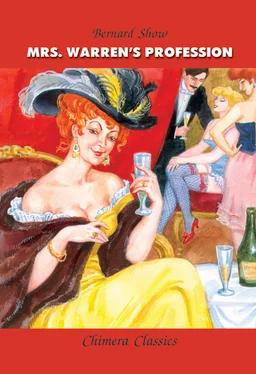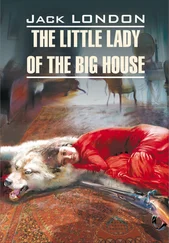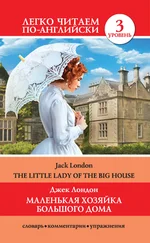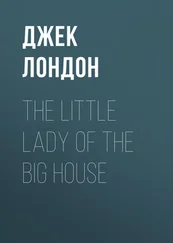THE LADY. Sir: you are overbold. Season your admiration for a while with—
THE MAN [holding up his hand to stop her] “Season your admiration for a while—”
THE LADY. Fellow: do you dare mimic me to my face?
THE MAN. T'is music. Can you not hear? When a good musician sings a song, do you not sing it and sing it again till you have caught and fixed its perfect melody? Season your admiration for a while”: God! the history of man’s heart is in that one word admiration. Admiration! [Taking up his tablets] What was it? “Suspend your admiration for a space—”
THE LADY. A very vile jingle of esses. I said “Season your—”
THE MAN [hastily] Season: ay, season, season, season. Plague on my memory, my wretched memory! I must e’en write it down. [He begins to write, but stops, his memory failing him]. Yet tell me which was the vile jingle? You said very justly: mine own ear caught it even as my false tongue said it.
THE LADY. You said “for a space.” I said “for a while.”
THE MAN. “For a while” [he corrects it]. Good! [Ardently] And now be mine neither for a space nor a while, but for ever.
THE LADY. Odds my life! Are you by chance making love to me, knave?
THE MAN. Nay: t'is you who have made the love: I but pour it out at your feet. I cannot but love a lass that sets such store by an apt word. Therefore vouchsafe, divine perfection of a woman—no: I have said that before somewhere; and the wordy garment of my love for you must be fire-new—
THE LADY. You talk too much, sir. Let me warn you: I am more accustomed to be listened to than preached at.
THE MAN. The most are like that that do talk well. But though you spake with the tongues of angels, as indeed you do, yet know that I am the king of words—
THE LADY. A king, ha!
THE MAN. No less. We are poor things, we men and women—
THE LADY. Dare you call me woman?
THE MAN. What nobler name can I tender you? How else can I love you? Yet you may well shrink from the name: have I not said we are but poor things? Yet there is a power that can redeem us.
THE LADY. Gramercy for your sermon, sir. I hope I know my duty.
THE MAN. This is no sermon, but the living truth. The power I speak of is the power of immortal poesy. For know that vile as this world is, and worms as we are, you have but to invest all this vileness with a magical garment of words to transfigure us and uplift our souls til earth flowers into a million heavens.
THE LADY. You spoil your heaven with your million. You are extravagant. Observe some measure in your speech.
THE MAN. You speak now as Ben does.
THE LADY. And who, pray, is Ben?
THE MAN. A learned bricklayer who thinks that the sky is at the top of his ladder, and so takes it on him to rebuke me for flying. I tell you there is no word yet coined and no melody yet sung that is extravagant and majestical enough for the glory that lovely words can reveal. It is heresy to deny it: have you not been taught that in the beginning was the Word? that the Word was with God? nay, that the Word was God?
THE LADY. Beware, fellow, how you presume to speak of holy things. The Queen is the head of the Church.
THE MAN. You are the head of my Church when you speak as you did at first. “All the perfumes of Arabia”! Can the Queen speak thus? They say she playeth well upon the virginals. Let her play so to me; and I’ll kiss her hands. But until then, you are my Queen; and I’ll kiss those lips that have dropt music on my heart. [He puts his arms around her].
THE LADY. Unmeasured impudence! On your life, take your hands from me.
The Dark Lady comes stooping along the terrace behind them like a running thrush. When she sees how they are employed, she rises angrily to her full height, and listens jealously.
THE MAN [unaware of the Dark Lady]. Then cease to make my hands tremble with the streams of life you pour through them. You hold me as the lodestar holds the iron: I cannot but cling to you. We are lost, you and I: nothing can separate us now.
THE DARK LADY. We shall see that, false lying hound, you and your filthy trull. [With two vigorous cuffs, she knocks the pair asunder, sending the man, who is unlucky enough to receive a righthanded blow, sprawling an the flags]. Take that, both of you!
THE CLOAKED LADY [in towering wrath, throwing off her cloak and turning in outraged majesty on her assailant]. High treason!
THE DARK LADY. [recognizing her and falling on her knees in abject terror]. Will: I am lost: I have struck the Queen.
THE MAN [sitting up as majestically as his ignominious posture allows] Woman: you have struck WILLIAM SHAKESPEAR.
QUEEN ELIZABETH. [stupent]. Marry, come up!!! Struck William Shakespear quotha! And who in the name of all the sluts and jades and light-o’-loves and fly-by-nights that infest this palace of mine, may William Shakespear be?
THE DARK LADY. Madam: he is but a player. Oh, I could have my hand cut off—
QUEEN ELIZABETH. Belike you will, mistress. Have you bethought you that I am like to have your head cut off as well?
THE DARK LADY. Will: save me. Oh, save me.
ELIZABETH. Save you! A likely saviar, on my royal word! I had thought this fellow at least an esquire; for I had hoped that even the vilest of my ladies would not have dishonoured my Court by wantoning with a baseborn servant.
SHAKESPEAR [indignantly scrambling to his feet]. Base-born! I, a Shakespear of Stratford! I, whose mother was an Arden! baseborn! You forget yourself, madam.
ELIZABETH [furious]. S’blood! do I so? I will teach you—
THE DARK LADY [rising from her knees and throwing herself between them] Will: in God’s name anger her no further. It is death. Madam: do not listen to him.
SHAKESPEAR. Not were it e’en to save your life, Mary, not to mention mine own, will I flatter a monarch who forgets what is due to my family. I deny not that my father was brought down to be a poor bankrupt; but twas his gentle blood that was ever too generous for trade. Never did he disown his debts. T'is true he paid them not; but it is an attested truth that he gave bills for them; and twas those bills, in the hands of base hucksters, that were his undoing.
ELIZABETH [grimly]. The son of your father shall learn his place in the presence of the daughter of Harry the Eighth.
SHAKESPEAR. [swelling with intolerant importance] Name not that inordinate man in the same breath with Stratford’s worthiest alderman. John Shakespear wedded but once: Harry Tudor was married six times. You should blush to utter his name.
THE DARK LADY. Will: for pity’s sake– crying out together
ELIZABETH. Insolent dog– SHAKESPEAR [cutting them short]. How know you that King Harry was indeed your father?
ELIZABETH. Zounds! Now by– [she stops to grind her teeth with rage]. THE DARK LADY. She will have me whipped through the streets. Oh God! Oh God!
SHAKESPEAR. Learn to know yourself better, madam. I am an honest gentleman of unquestioned parentage, and have already sent in my demand for the coat-of-arms that is lawfully mine. Can you say as much for yourself?
ELIZABETH [almost beside herself]. Another word; and I begin with mine own hands the work the hangman shall finish.
SHAKESPEAR. You are no true Tudor: this baggage here has as good a right to your royal seat as you. What maintains you on the throne of England? Is it your renowned wit? your wisdom that sets at naught the craftiest statesmen of the Christian world? No. T'is the mere chance that might have happened to any milkmaid, the caprice of Nature that made you the most wondrous piece of beauty the age hath seen. [Elizabeth’s raised fists, on the point of striking him, fall to her side]. That is what hath brought all men to your feet, and founded your throne on the impregnable rock of your proud heart, a stony island in a sea of desire. There, madam, is some wholesome blunt honest speaking for you. Now do your worst.
Читать дальше
Конец ознакомительного отрывка
Купить книгу












